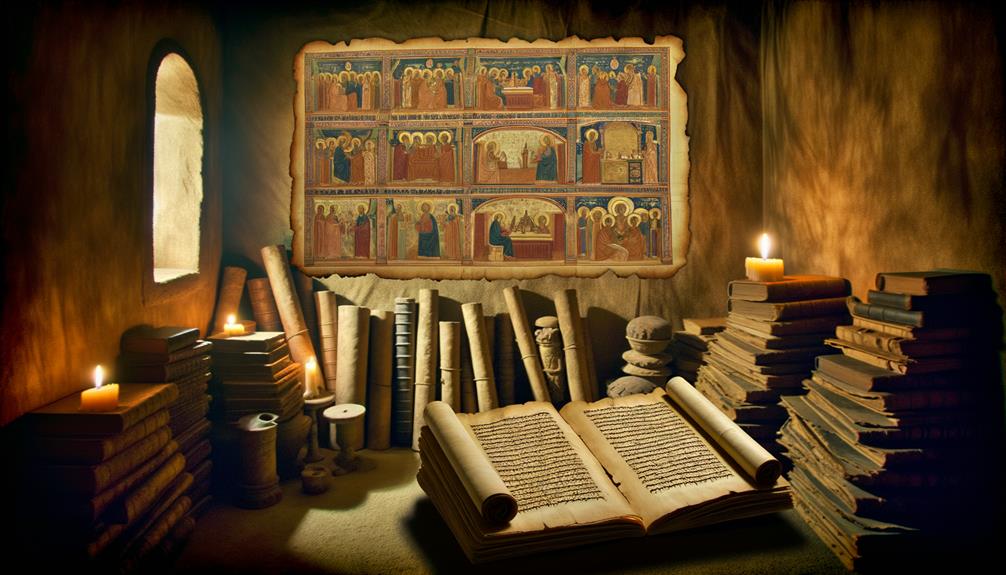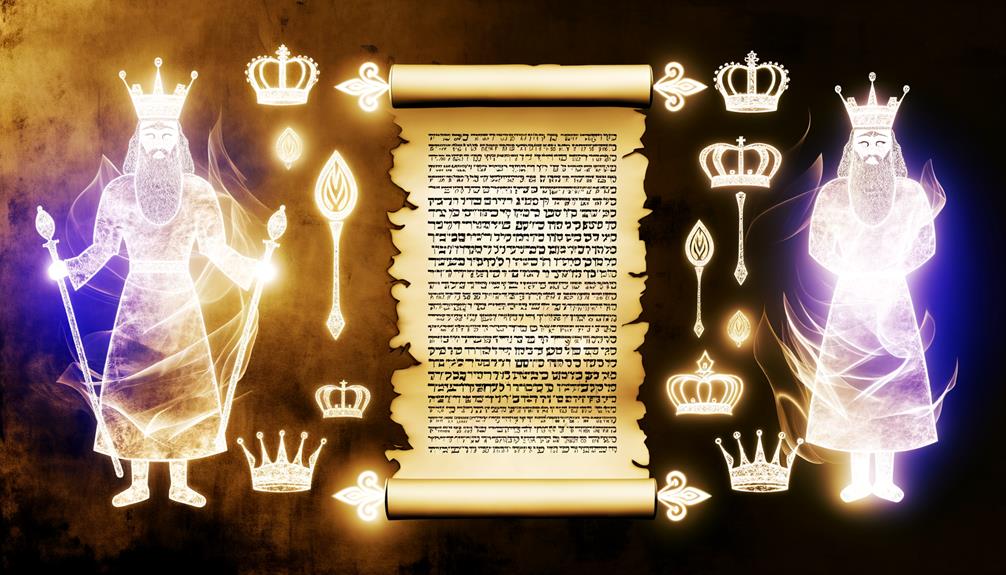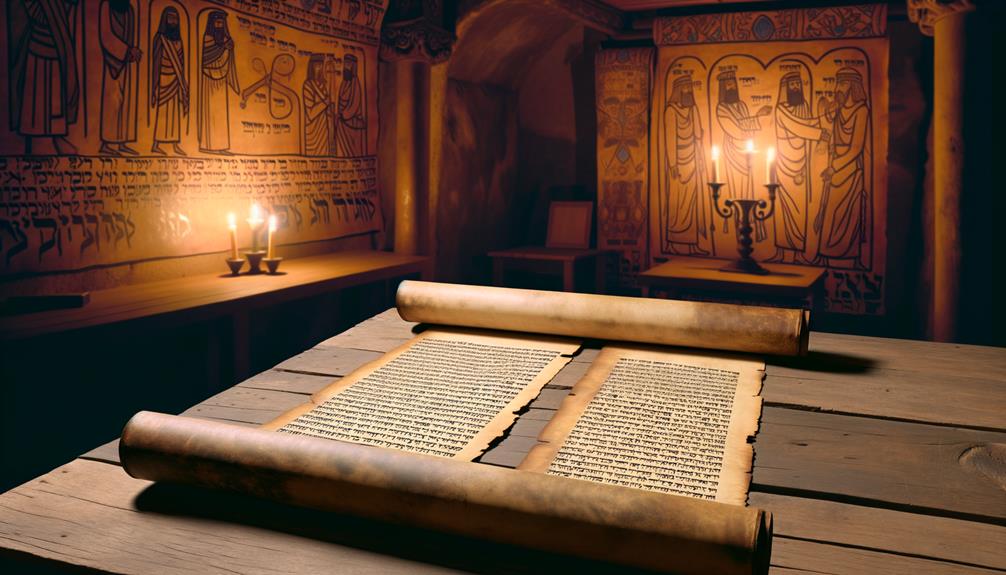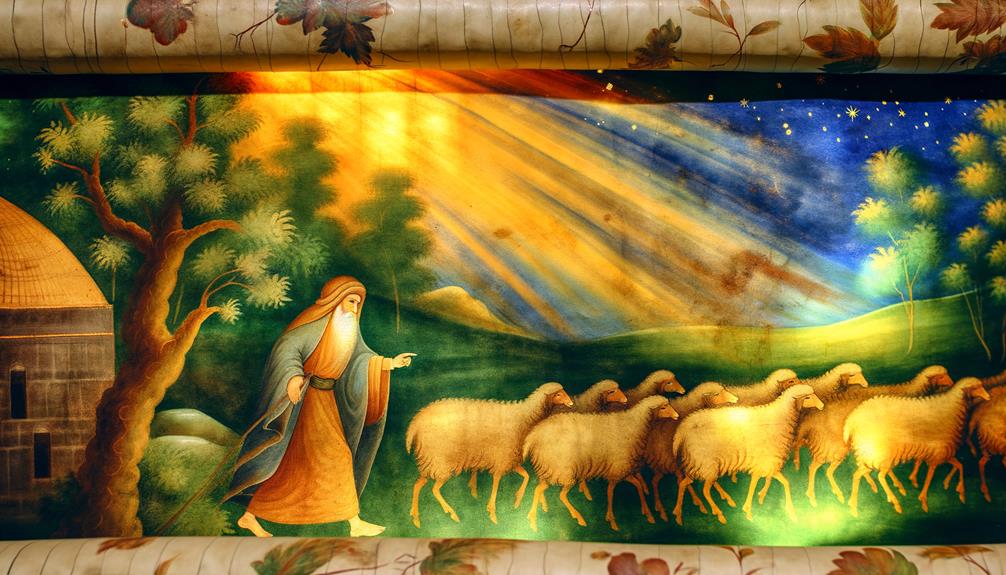Meaning of Chronicles in the Bible: History and Legacy
The Books of Chronicles, composed during the post-exilic period, are a theological and historical recount of Israel’s sacred history. They underscore the paramount importance of the Davidic covenant, temple worship, and adherence to God’s laws.
Chronicles detail genealogies from Adam to King Saul, the reigns of David and Solomon, and the postexilic community’s restoration, emphasizing divine sovereignty and covenantal faithfulness. The text sheds light on the essential role of the temple and worship in ancient Israelite identity.
By exploring these themes, one discovers the enduring significance and divine assurance offered to the original audience and contemporary readers alike.

Meaning of Chronicles in the Bible: Purpose, Themes, and Spiritual Lessons
| Aspect | Details |
|---|---|
| Name | Chronicles |
| Meaning | Historical records or accounts |
| Biblical Books | 1 Chronicles and 2 Chronicles |
| Primary Focus | Genealogies, reign of David, Solomon, and the kings of Judah |
| Key Themes | Worship, covenant, temple, faithfulness, and God’s sovereignty |
| Spiritual Symbolism | Chronicles emphasizes God’s ongoing plan, the importance of worship, and remembering His works |
| Faith Insight | Teaches the value of remembering spiritual heritage and staying faithful to God’s covenant |
Historical Context

The historical context of the Books of Chronicles is pivotal for understanding their theological and scriptural significance, as they were composed during the post-exilic period when the Israelites were re-establishing their identity and religious practices. This era followed the Babylonian captivity, a time of profound upheaval and reflection for the Jewish community.
Chronicles offers a retrospection that highlights the Davidic covenant, temple worship, and the priestly lineage, emphasizing continuity and divine faithfulness. By revisiting Israel’s history, the Chronicler aimed to inspire hope and adherence to God’s statutes.
This historical introspection served a dual purpose: it reinforced communal identity and underscored the importance of religious reforms instituted by leaders like Ezra and Nehemiah, thereby shaping the post-exilic theological landscape.
Structure and Content

Comprising two distinct books, Chronicles meticulously catalogs genealogies and narratives that underscore Israel’s sacred history and theological themes.
Chronicles opens with extensive genealogies from Adam to King Saul, establishing continuity with the broader biblical tradition. The narrative then shifts to the reign of David, emphasizing his central role in Israel’s religious life, particularly his preparations for the temple.
The second book continues with Solomon’s reign and the subsequent history of the divided kingdoms until the Babylonian exile. The meticulous recording of temple worship, the priesthood, and the Levites underscores the religious and liturgical dimensions of Israelite society.
Through this structure, Chronicles presents a theological reflection on Israel’s past, highlighting divine faithfulness and the importance of covenantal loyalty.
Theological Themes

Central to the theological themes of Chronicles is the unwavering emphasis on divine sovereignty and covenantal faithfulness, illuminating God’s enduring relationship with Israel throughout its history.
Chronicles portrays God as the ultimate ruler who orchestrates the nation’s fate, rewarding obedience and punishing disobedience. This theme is interwoven with the concept of covenant, highlighting God’s steadfast commitment despite Israel’s recurrent failures.
Additionally, the Chronicler underscores temple worship and adherence to the Mosaic Law as essential for maintaining this divine-human relationship.
Through detailed genealogies and historical accounts, Chronicles affirms the continuity of God’s promises from Adam through the post-exilic community, thereby providing theological assurance and hope for restoration to its original audience.
Focus on Davidic Line

The chronicler places significant emphasis on the Davidic line, highlighting David’s ancestry and legacy as foundational to Israel’s identity and God’s promises.
Central to this focus is the covenant with David, wherein God assures the perpetuity of David’s throne, a theme that resonates through the succession of kings documented in Chronicles.
This theological and historical emphasis underscores the enduring significance of David’s lineage in the narrative of Israel’s faith and governance.
David’s Ancestry and Legacy
Tracing the Davidic line reveals a rich tapestry of theological significance and historical context, highlighting David’s pivotal role in the lineage of Israel’s kings and the messianic prophecy.
David’s ancestry, meticulously chronicled in 1 Chronicles 2-3, connects him to the tribe of Judah, fulfilling Jacob’s blessing in Genesis 49:10. This lineage underscores God’s sovereign plan through ordinary human history.
David’s legacy, established through his military conquests, administrative reforms, and spiritual devotion, set a divine precedent for future rulers. His reign, portrayed as an archetype of the ideal theocratic king, anchors the scriptural promise of an eternal kingdom.
Consequently, the Davidic line serves as a cornerstone for understanding Israel’s past and the anticipated messianic fulfillment.
Covenant With David
Building on the significance of David’s lineage, the covenant with David, as chronicled in 1 Chronicles 17, embodies a divine promise that extends his dynasty and solidifies the foundation for the messianic hope.
This covenant is pivotal in understanding the theological and historical landscape of the Hebrew Bible.
Here are key aspects:
- Eternal Dynasty: God promises David an everlasting dynasty, emphasizing the perpetual nature of his lineage (1 Chronicles 17:12).
- Messianic Prophecy: This covenant lays the groundwork for messianic expectations, anticipating a future leader from David’s line (1 Chronicles 17:14).
- Divine Relationship: The covenant underscores a unique relationship between God and David’s descendants, ensuring divine favor and guidance (1 Chronicles 17:13).
Succession of Kings
A critical examination of the Davidic line reveals a succession of kings whose reigns are marked by both divine favor and human frailty, shaping the historical and theological narrative of Israel.
Chronicles meticulously records the lineage starting with David, emphasizing his covenant with God as a theological cornerstone.
Solomon’s reign, marked by wisdom and the construction of the Temple, is depicted as an era of divine favor.
However, subsequent kings oscillate between fidelity and apostasy, reflecting human frailty and the resultant consequences.
The Chronicler highlights periods of religious reform under kings like Hezekiah and Josiah, juxtaposed with the failures of others, underscoring the conditional nature of divine blessings.
This lineage ultimately reinforces the eschatological hope in a messianic king.
Importance of the Temple

The Temple, as depicted in the Chronicles, holds profound spiritual significance, symbolizing God’s dwelling among His people and serving as the epicenter of worship and communal life.
Historically, its construction under Solomon’s reign fulfilled David’s divinely inspired vision, cementing the Temple’s role as a focal point for Israelite identity and religious practice.
Scripturally, it underscores the covenantal relationship between God and Israel, emphasizing themes of holiness, sacrifice, and divine presence.
Temple’s Spiritual Significance
Central to the spiritual life of ancient Israel, the temple served as the epicenter for worship, religious rituals, and the manifest presence of God among His people. Its significance is multi-faceted:
- Divine Dwelling: The temple represented God’s tangible presence, as seen in 1 Kings 8:10-11 where the glory of the Lord filled the house.
- Covenantal Symbol: It was a physical reminder of the covenant between God and Israel, reinforcing their unique relationship (2 Chronicles 7:16).
- Spiritual Renewal: The temple offered a place for repentance and atonement, essential for spiritual purification (2 Chronicles 29:15-17).
Understanding the temple’s spiritual significance consequently provides a deeper appreciation of its role in Israelite society and Biblical theology.
Role in Worship
In addition to its spiritual significance, the temple played a fundamental role in the worship practices of ancient Israel, serving as the designated location for sacrifices, festivals, and communal prayers.
The Chronicler underscores the centrality of the temple in maintaining covenantal faithfulness, as seen in 2 Chronicles 7:12-16, where God’s presence and favor are directly linked to the temple’s consecration.
Historically, the temple was essential for ritual purity and communal identity, embodying the nation’s religious and social epicenter.
Scripturally, the temple facilitated obedience to Mosaic Law, enabling Israel to fulfill their liturgical duties.
Through an analysis of Chronicles, one discerns that the temple was indispensable, not merely as a physical structure, but as a locus of divine-human interaction.
Comparison With Samuel and Kings

While both Chronicles and the books of Samuel and Kings recount the history of Israel, Chronicles offers a distinct theological perspective that emphasizes the centrality of temple worship and the Davidic covenant. This nuanced portrayal can be understood through several key differences:
- Focus on Judah: Chronicles mainly highlights the southern kingdom of Judah, presenting a more favorable view of its kings, particularly David and Solomon.
- Temple and Worship: Emphasis is placed on the construction, rituals, and significance of the temple in Jerusalem, underscoring its role in Israel’s spiritual life.
- Genealogies: Chronicles begins with extensive genealogies, establishing continuity from Adam through David, thereby connecting Israel’s past to their identity and covenantal promises.
These differences reflect Chronicles’ broader theological goals.
God’s Faithfulness

Chronicles underscores God’s unwavering faithfulness by meticulously recounting His covenantal promises and their fulfillment throughout Israel’s history.
This thorough narration highlights the fidelity of God in preserving the Davidic line and the nation, even amidst Israel’s recurring disobedience.
The Chronicler’s emphasis on divine faithfulness is evident in the meticulous documentation of genealogies, temple worship, and the reforms of godly kings.
| Aspect | Description |
|---|---|
| Covenantal Promises | God’s promises to Abraham, David, and the nation of Israel |
| Genealogies | Detailed records affirming God’s preservation of His people |
| Temple Worship | Central role of the temple as a symbol of divine presence |
| Reforms | Renewals led by kings demonstrating covenantal faithfulness |
This theological framework provides historical context and scriptural analysis, illustrating God’s enduring commitment to His people.
Relevance for Today

The theological themes presented in Chronicles offer profound insights into the relevance of God’s faithfulness and covenantal promises for contemporary believers.
By examining the historical context and scriptural text, we can draw significant lessons:
- God’s Sovereignty: Chronicles emphasizes God’s control over history, reassuring believers of His omnipotence amidst modern uncertainties.
- Covenantal Faithfulness: The consistent fulfillment of God’s promises to Israel underscores the reliability of His Word, encouraging trust in divine promises today.
- Community and Worship: Chronicles highlights the importance of communal worship and adherence to God’s statutes, reminding modern readers of the value of collective faith practices.
These themes serve as enduring reminders of the steadfast nature of God and His unchanging commitment to His people, providing a robust foundation for contemporary Christian faith.
Conclusion
The Chronicles serve as a tapestry weaving together Israel’s history, the Davidic lineage, and the centrality of the Temple, illuminating God’s unwavering faithfulness.
Through meticulous structure and profound theological themes, Chronicles not only complement but also contrast Samuel and Kings, offering a unique perspective on divine providence.
As a beacon for contemporary believers, Chronicles underscores the enduring relevance of covenantal promises and divine sovereignty, reminding all that history is ultimately His story.






